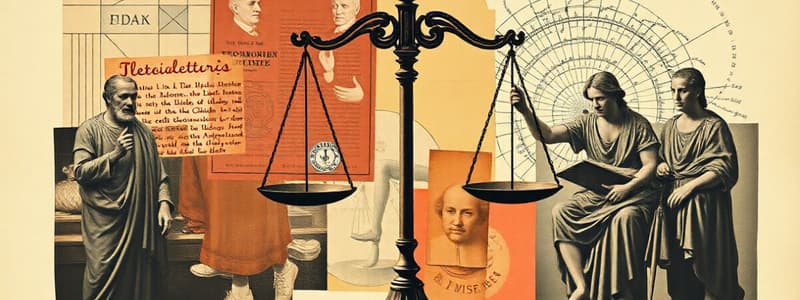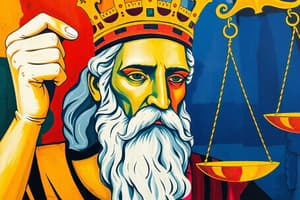Podcast
Questions and Answers
What definition of justice does Thrasymachus provide?
What definition of justice does Thrasymachus provide?
- Justice is about telling the truth.
- Justice is repaying debts.
- Justice is what benefits the strong. (correct)
- Justice is a universal concept.
According to Plato, what does the notion of justice related to the powerful leave out?
According to Plato, what does the notion of justice related to the powerful leave out?
- A sense of fairness.
- Personal responsibility.
- Moral accountability. (correct)
- Individual affairs.
How does Socrates challenge Thrasymachus' view of justice?
How does Socrates challenge Thrasymachus' view of justice?
- By suggesting justice should not be based on authority. (correct)
- By arguing that justice is inherently profitable.
- By claiming that wrongness can benefit individuals.
- By stating that power is the true measure of justice.
In Glaucon's classification of goods, to which class does he place justice?
In Glaucon's classification of goods, to which class does he place justice?
What are the three parts of individuals according to Plato?
What are the three parts of individuals according to Plato?
How does Plato ultimately define justice?
How does Plato ultimately define justice?
What is one problematic aspect of the traditional understanding of justice discussed in the content?
What is one problematic aspect of the traditional understanding of justice discussed in the content?
What key concept does Plato's discussion of justice center around?
What key concept does Plato's discussion of justice center around?
What is the primary focus of Plato's concept of justice?
What is the primary focus of Plato's concept of justice?
How does Aristotle's view of justice contrast with that of Plato?
How does Aristotle's view of justice contrast with that of Plato?
Which of the following elements is NOT part of Plato's understanding of justice?
Which of the following elements is NOT part of Plato's understanding of justice?
What foundational aspect does Aristotle associate with justice?
What foundational aspect does Aristotle associate with justice?
How is justice viewed differently by Plato compared to Aristotle?
How is justice viewed differently by Plato compared to Aristotle?
Which philosopher is associated with the ideal state structure in relation to justice?
Which philosopher is associated with the ideal state structure in relation to justice?
Which term best describes Aristotle's exploration of justice?
Which term best describes Aristotle's exploration of justice?
What essential theme regarding justice is highlighted in the philosophies of both Plato and Aristotle?
What essential theme regarding justice is highlighted in the philosophies of both Plato and Aristotle?
What is the primary focus of Aristotle's theory of corrective justice?
What is the primary focus of Aristotle's theory of corrective justice?
According to Aristotle, what relationship does justice have with equality?
According to Aristotle, what relationship does justice have with equality?
What type of justice aims to establish a fair balance among individuals according to Aristotle?
What type of justice aims to establish a fair balance among individuals according to Aristotle?
What does Aristotle argue is necessary for a comprehensive understanding of justice?
What does Aristotle argue is necessary for a comprehensive understanding of justice?
In the context of justice, what role does Aristotle assign to the concept of law?
In the context of justice, what role does Aristotle assign to the concept of law?
Which philosopher introduced the concept of justice in his work 'Politeia'?
Which philosopher introduced the concept of justice in his work 'Politeia'?
What is the crucial position of justice within Aristotle's system of virtues?
What is the crucial position of justice within Aristotle's system of virtues?
Which aspect of justice does legal justice specifically address?
Which aspect of justice does legal justice specifically address?
What aspect of justice does Plato emphasize in relation to the human soul?
What aspect of justice does Plato emphasize in relation to the human soul?
How does Aristotle's concept of justice differ from Plato's?
How does Aristotle's concept of justice differ from Plato's?
According to Plato, what role does moderation play in justice?
According to Plato, what role does moderation play in justice?
What criticisms do some have regarding Plato's alignment of the individual soul and the state?
What criticisms do some have regarding Plato's alignment of the individual soul and the state?
In Plato's philosophy, what is seen as an integral component of justice?
In Plato's philosophy, what is seen as an integral component of justice?
What does Plato identify as a consequence of injustice?
What does Plato identify as a consequence of injustice?
What does Plato propose as a necessary phase for establishing a state?
What does Plato propose as a necessary phase for establishing a state?
In Plato's ideal state model, what is the primary function of the ruling class?
In Plato's ideal state model, what is the primary function of the ruling class?
Which form of government does Plato consider the worst example of injustice?
Which form of government does Plato consider the worst example of injustice?
What does Aristotle emphasize as a foundation for societal order?
What does Aristotle emphasize as a foundation for societal order?
How does Aristotle connect justice and freedom?
How does Aristotle connect justice and freedom?
What is a key difference between Plato and Aristotle's views on justice?
What is a key difference between Plato and Aristotle's views on justice?
What aspect of justice does Aristotle delve into alongside societal order?
What aspect of justice does Aristotle delve into alongside societal order?
What philosophical stance differentiates Plato's views from Aristotle's?
What philosophical stance differentiates Plato's views from Aristotle's?
How do both philosophers view the role of justice in the state?
How do both philosophers view the role of justice in the state?
What do both Plato and Aristotle agree on concerning society?
What do both Plato and Aristotle agree on concerning society?
Flashcards are hidden until you start studying
Study Notes
Overview of Justice in Plato and Aristotle's Philosophy
- Justice is a significant theme explored by ancient Greek philosophers Plato and Aristotle, highlighting their distinct interpretations that shaped philosophical thought.
- Plato links justice to the internal order of the individual, advocating for an ideal state structure, while Aristotle addresses real justice through inequality and fair distribution principles.
Plato's Concept of Justice
- Justice is founded on the balance among three parts of the soul: reason, courage, and desire.
- Traditional definitions of justice, such as repaying debts and truth-telling, are deemed insufficient; scenarios involving moral dilemmas challenge these definitions.
- Thrasymachus defines justice as benefiting the strong, suggesting power dynamics shape the perception of justice, which Plato criticizes.
- Glaucon classifies goods into three categories; Socrates argues that justice belongs to the highest form, contradicting Glaucon's view.
- Plato emphasizes that justice arises from individuals performing their roles effectively, similar to harmony in a structured state.
- Justice encompasses equality, where individuals assert their rights and ensure mutual benefit within society.
- Plato's work "Politeia" (The Republic) introduces justice as a means to resist wrongful temptations and maintain moral integrity.
- He suggests a strict division among social classes, with justice being pivotal for the state's core structure.
Aristotle's Concept of Justice
- Aristotle focuses on corrective justice, which seeks to rectify injustices and restore balance, emphasizing the role of a judge.
- Justice is understood through both universal (legal) and particular (distributive) dimensions, aiming for a fair balance among individuals.
- Legal justice preserves societal order, while distributive justice ensures equitable shares for individuals based on merit.
- Aristotle asserts that a just person adheres to laws and equality, while injustice arises from law deviations and neglecting equality.
- He promotes a more pragmatic view of justice, advocating for equity in societal structures without rigid class distinctions.
- Justice is intrinsically linked to personal happiness and virtue, positioning it as a fundamental element for societal well-being.
Comparative Analysis
- Plato envisions an idealized societal structure with clear class divisions, advocating for a ruling class's domination.
- Aristotle stresses real-world application, arguing for justice based on equitable distribution and the sharing of resources.
- Both philosophers recognize the importance of justice in a functioning society but diverge on the nature of societal organization and justice's role within it.
- Plato’s viewpoint tends towards a static ideal, while Aristotle focuses on dynamic and practical justice suitable for current social conditions.
Studying That Suits You
Use AI to generate personalized quizzes and flashcards to suit your learning preferences.




